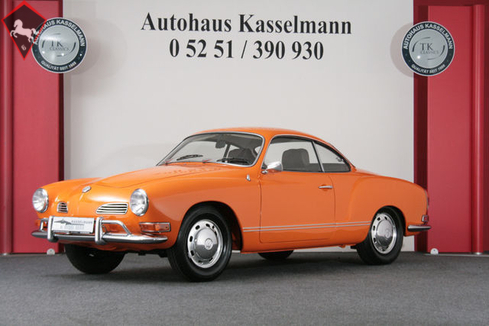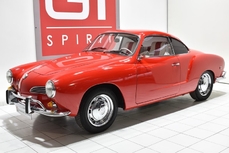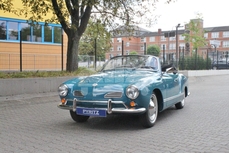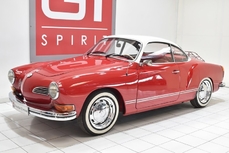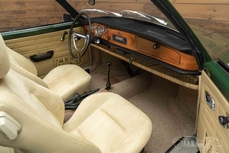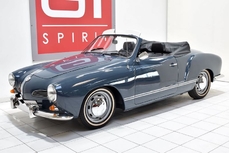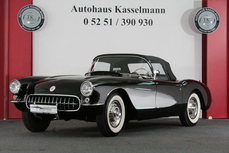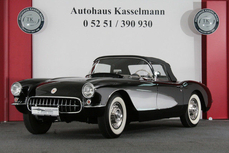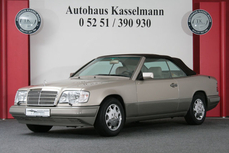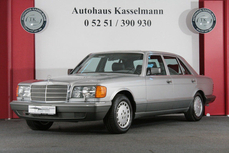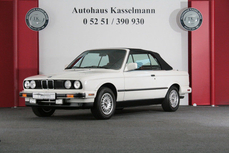Volkswagen Karmann-Ghia Typ 14, 50 PS 1971
General description :
Dieser außergewöhnliche Karmann Ghia hat eine einmalige Karosserie, die nie geschweißt wurde und auch nicht verrostet war.
Deshalb haben wir uns entschieden, obwohl die Lackierung eigentlich nicht schlecht war, den Karmann neu zu
lackieren. Der Unterboden wurde gereinigt und erhielt ebenfalls neue Farbe. Selbstverständlich wurde auch eine Hohlraumkonservierung durchgeführt. Die komplette Bremsanlage wurde überholt. Die Dichtungen,
die erneuert werden mussten, wurden ersetzt. Die Frontscheibe, Kupplung, Reifen und noch vieles mehr wurden
erneuert. Der Motor und das Getriebe funktionieren einwandfrei. Die originale Innenausstattung wurde gereinigt und gibt dem Fahrzeug die Originalität.
Ein Karmann Ghia, der sich von vielen anderen unterscheidet und bei guter Pflege der Nachwelt ewig erhalten bleibt. Die Anschaffung vor der Restauration und die durchgeführten Arbeiten waren nicht günstig, deshalb ist der Kaufpreis zwingend erforderlich.
Es ist mit Sicherheit besser etwas mehr Geld auszugeben und dafür dann das bessere Auto zu bekommen. Hier ist das
eindeutig der Fall.
Weitere Fahrzeugbilder auf unserer Homepage: http://www.autohaus-kasselmann.de
Kunstleder
Radio
Heckantrieb
HU + AU wird vor Verkauf erneuert
-für Tippfehler keine Haftung - Irrtümer vorbehalten-
14 Zoll Leichtmetallfelgen
https://home.mobile.de/KASSELMANN#des_258824195
1971 Volkswagen Karmann-Ghia Typ 14, 50 PS is listed sold on ClassicDigest in Schulze-Delitzsch-Str. 19-21DE-33100 Paderborn by Auto Dealer for €32800.
Car Facts
Car type : Car Make : Volkswagen Model : Karmann-Ghia Model Version : Typ 14, 50 PS Engine size : 1.6 Model Year : 1971 Sub type : Coupé Location : Schulze-Delitzsch-Str. 19-21DE-33100 Paderborn
Sold
Seller Information
Sold
People who viewed this Volkswagen Karmann-Ghia also viewed similar Volkswagen listed at ClassicDigest
Other cars listed for sale by this dealer
About Volkswagen
The Volkswagen story is indeed an intriguing tale of innovation, resilience, and post-war revival, marked by various models that have become iconic in automotive history.The People's Car (Volkswagen): Initially envisioned by Adolf Hitler in the 1930s as a "people's car" or "Volkswagen" in German, the idea was to create an affordable and practical vehicle for the German people. This concept led to the development of the Volkswagen Beetle (or the Type 1), designed by Ferdinand Porsche.
Post-War Challenges: After World War II, Volkswagen faced significant challenges. The factory was heavily damaged, and the brand's association with the Nazi regime led to a lack of interest in the car in some regions.
British Intervention - The British Army & Ivan Hirst: The British Army took control of the factory in the immediate post-war period. Major Ivan Hirst, a British Army officer, played a crucial role in reviving Volkswagen. He recognized the potential of the Beetle and advocated for its production, convincing the British military to order several thousand cars. This decision helped jumpstart the brand's revival.
Export Success and the Beetle's Global Appeal: The Beetle gained popularity not only in Germany but also globally, becoming an icon of affordable motoring. Its simple, reliable design and unique appearance made it a favorite among consumers worldwide.
Model Evolution: Over the years, Volkswagen introduced various models alongside the Beetle, each contributing to the brand's growth:
Type 2 (VW Bus or Transporter): Introduced in the 1950s, it became an iconic symbol of the hippie movement in the 1960s, loved for its spaciousness and versatility.
Golf (Rabbit in the U.S.): Launched in the mid-1970s, the Golf (or Rabbit in the U.S.) marked a shift towards front-wheel-drive, modern design, and hatchback practicality, becoming a cornerstone of the brand's success.
Passat, Jetta, and Other Models: Volkswagen expanded its lineup with models like the Passat and Jetta, catering to different market segments.
Challenges and Innovations: Despite success, Volkswagen faced challenges, including quality issues in the 1970s. However, the brand continued to innovate and develop new models and technologies.
Rise of the GTI and Global Expansion: The 1980s saw the rise of the iconic Golf GTI, a high-performance version that sparked the hot hatch trend. Volkswagen also expanded its global presence during this period.
The British intervention in reviving Volkswagen after World War II played a pivotal role in the brand's resurgence. While there might have been some tensions or competition among automotive companies in the 1950s and 1960s due to Volkswagen's post-war success, the brand's ability to produce innovative and popular models solidified its place in automotive history.
